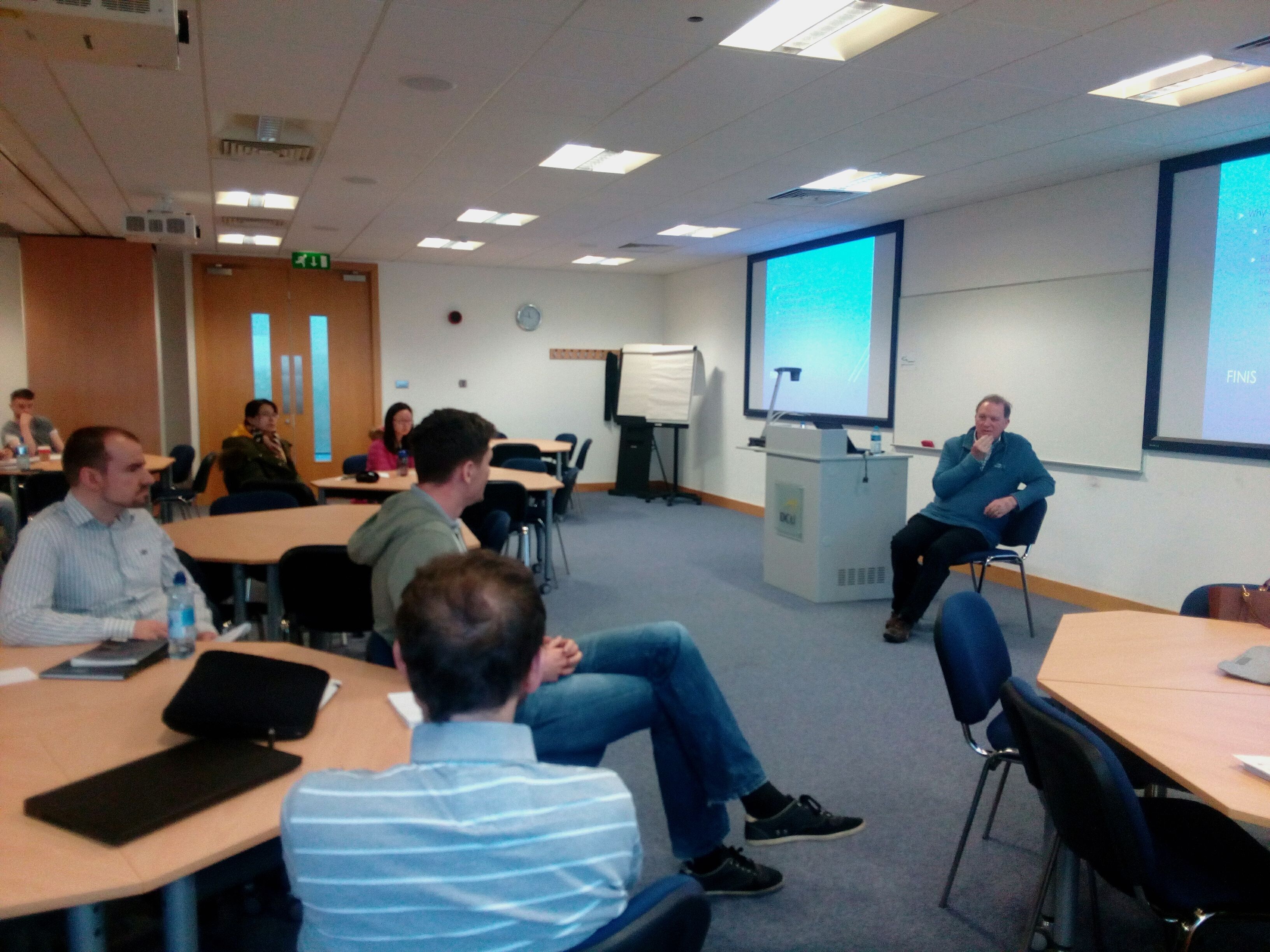

Risk and ‘transgressive entrepreneurship’ with Professor Richard Harrison
Two weeks ago, students and researchers were given food for thought at a talk held by DCU Centre for Family Business. Professor Richard Harrison, Professor of Entrepreneurship and Innovation and Director of the Compassionate Leadership Initiative at University of Edinburgh Business School, presented some of his research and ideas concerning the relationship between risk and entrepreneurship.
Risk is something that family businesses think about when they plan for the future and make decisions for growth, or stability. But sometimes it is this evaluation of risk which can dull the entrepreneurial edge within family businesses, and lead to a sameness which can end up becoming a form of entrepreneurial self-harm. In this discussion, Professor Harrison asks us to think about risk differently. If we take this logic and apply it to family business and entrepreneurship, we might change the thought processes behind the evaluation of risk into an innovative activity.
Professor Harrison has produced extensive research into several areas of interest around the nature of entrepreneurial processes, including entrepreneurial ecosystems, entrepreneurship and innovation in emerging economies, and the post-Bordieusian analysis of gender and entrepreneurship. In 2015 he received the UK ESCR Outstanding Impact on Business Award for his research on angel finance and is currently researching identity work in entrepreneurship.
Why we take risks in entrepreneurship – some background and context
The talk, entitled ‘Sex, Drugs, and Death: Entrepreneurship as Transgressive Practice’, brought forward a different perspective on entrepreneurship and decision-making. Grounding the discussion on the culture and history of risk in enterprise, the concepts of risk, rationality, and their philosophical contexts, Professor Harrison is encouraging us to reimagine risk in entrepreneurial practice.
Among several questions he asks is this:
“How do we understand the voluntary engagement in risky behaviour?’’
This is where we pause, to become introspective and think about our own engagement in risky behaviour. Prof. Harrison speaks about high adrenaline extreme sports, high frequency bond trading, and engagement with sex workers as examples of entrepreneurial activities which contain risk that the individual must experience. These are situations where risk can also be transgressive. He then leads us on to a discussion about Edgeworth, and the “sociology of the edge”, which Prof. Harrison says “has mileage in entrepreneurship’’. Again, the question of why do we engage in these activities, if there is no guarantee of ‘reward’? One reason he provides is the intrinsic satisfaction that comes from this risk – the “buzz”, and the act of satisfying one’s appetite for risk. Of being on the edge of the norm, and ‘the acceptable’.

Professor Harrison answers questions from DCU PhD students
The argument he presents is based on the idea of consumption. He classifies engaging in risky activities as “hedonistic consumption”, whereby the willing individual gains a sensory benefit from the act. There are also emotive benefits, possibilities for self-determination, and feelings of escapism. Essentially, Prof. Harrison describes transgressive entrepreneurship as an emerging social order, which can also challenge the existing social order in its activities, and resit convention in entrepreneurship and society.
Professor Harrison applies this logic to stock traders, and on a more interesting train of thought, he brings us to the topic of angel investors. Angel investors are individuals who provide the financial support and capital for business start-ups, and voluntarily take that risk at the early stages of the venture. There is no guarantee of reward, however through the lens of gratuitous risk taking, there is something to be gained at the outset. Professor Harrison concludes his presentation with a statement about the inescapability of risk, as an intrinsic feature of entrepreneurial action which ultimately has implications for public policy in our society.
How does this reimagining of risk fit into entrepreneurial practice?
Following this, a Q&A session elicited several other aspects of transgressive entrepreneurship, and how it plays out in society. An interesting point made during this presentation and worth noting was that we, as a society, have come to accept certain risky behaviours as acceptable, and others as unacceptable. The legal versus the illegal. When you apply this to the accepted norms within finance, and specifically within stock trading, it does make you wonder how we came to draw a line somewhere between the two.
The encouragement to resist convention within entrepreneurship challenges us to think about risk differently. Resisting that sameness which can ultimately lead to destruction. An interesting TED Talk from Vikram Bhalla speaks about the differences between family businesses in the developed world and the emerging markets. He points out that family business in emerging economies act in exactly the opposite ways to family business in the developed world, in that they grow faster, focus less on risk mitigation, and they retain family members in the business to a much greater extent as time goes on. Similar to Professor Harrison, Vikram Bhalla is asking us to look at things differently.
Thinking differently about risk could potentially help those at the helm of family businesses pursue entrepreneurship in a way that both protects the company’s future, and leads to innovative growth on a path of its own. Entrepreneurs could ask themselves, “can I turn this risk into something for my business?”
Stepping into the realm of transgressive entrepreneurship has potential rewards that can go beyond sensory satisfaction. One industry where individual entrepreneurship is making an effort to redraw the lines of acceptability, and where angel investors are playing a crucial role is sextech. Earlier this year, the sextech entrepreneur Cindy Gallop received a $2m donation from an anonymous investor, in support of her start-up initiative which aims to change our perceptions of sex “from shameful to social’’. The aim of the venture is social change, and the presence of risk certainly shapes its future. Sextech has a definite sense of purpose which isn’t following the ‘norm’, and it is growing exponentially on this risk.
The discussion that Professor Harrison presented to us at DCU intended to shed some light on different ways of thinking about the relationship between risk, decision-making, and enterprise. His discussion is one that seems to have the potential to extend further beyond the realms of business and entrepreneurship and has at least in this instance left us with some interesting questions to think about.

